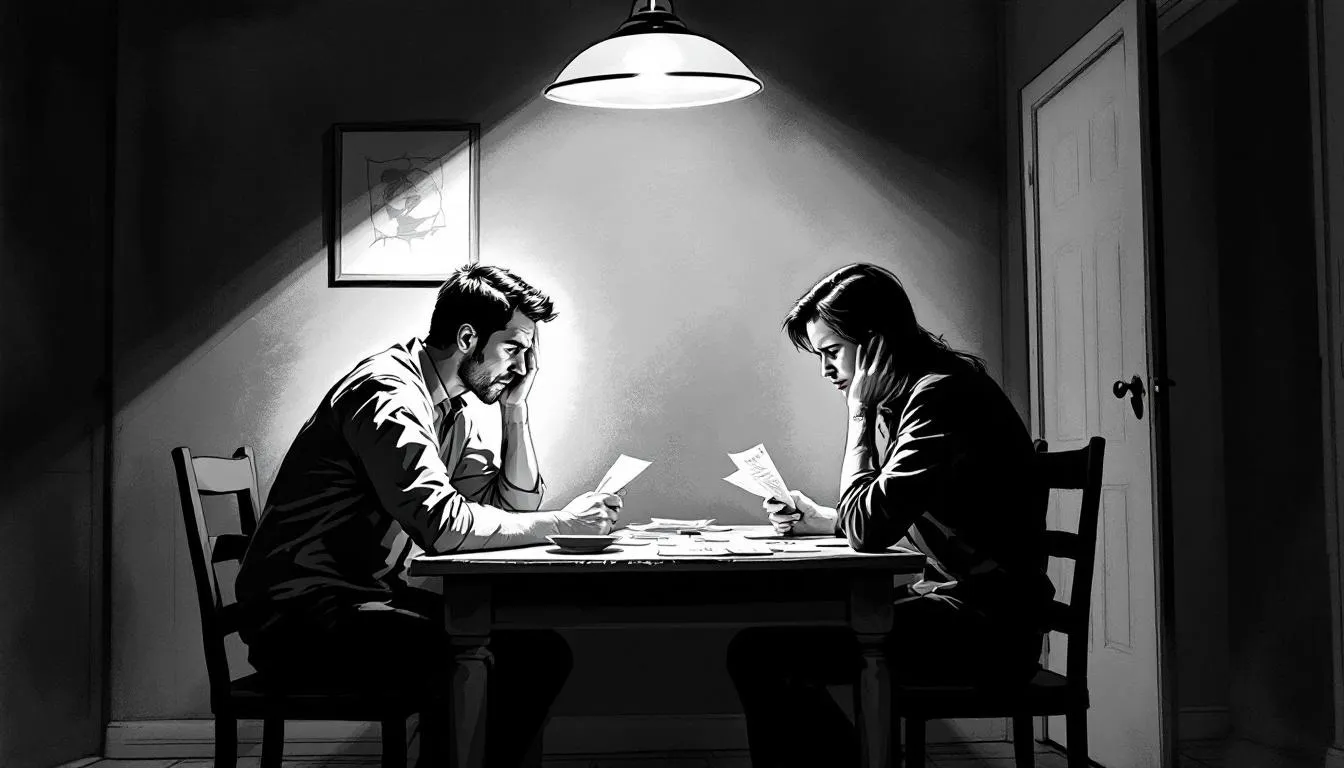If you’re considering bankruptcy, you may be concerned about how it will impact your spouse. Our guide explains how bankruptcy impacts a spouse’s credit, debts, and financial responsibilities. Whether it’s Chapter 7 or Chapter 13, understanding these impacts can help you protect your spouse and family’s financial well-being.
Key Takeaways
- Filing for bankruptcy individually typically does not impact a non-filing spouse’s credit report, unless there are joint debts. If the debt is repaid in full with interest, the spouse also receives the court’s protection. The spouse is primarily impacted when the co-signed debts are not paid at 100%.
- In community property states, both spouses are jointly liable for debts incurred during the marriage. In common law states like Kentucky, only the filing spouse is affected. The non-filing spouse’s assets and credit are only impacted if they cosign the debt.
- The income of a non-filing spouse plays a crucial role in determining bankruptcy eligibility and repayment plans, influencing whether the filing spouse qualifies for Chapter 7 or must opt for Chapter 13. The court uses family income to determine whether you qualify to file Chapter 7.
How Filing Bankruptcy Affects Your Spouse’s Credit
One of the most pressing concerns when filing for bankruptcy is how it will affect your spouse’s credit. If you file individually, your spouse’s credit report remains untarnished by your bankruptcy filing. This means that your spouse can maintain their credit score, which can be crucial for future financial stability. However, the story changes when joint accounts are involved.
Joint accounts, such as credit cards or loans, can be a double-edged sword. While bankruptcy may discharge your responsibility for these debts, it can result in the closure of these accounts, which can negatively impact your spouse’s credit score. If your spouse has co-signed any loans with you, they will be held responsible for the remaining balance if you no longer make the payments 100% on time and with interest. This can be a significant burden and can have a severe impact on their credit report.
Another critical factor to consider is the non-filing spouse’s income. When determining Chapter 7 bankruptcy eligibility, the court includes the non-filing spouse’s income in the means test. However, personal expenses of the non-filing spouse can be deducted, potentially allowing the filing spouse to qualify for Chapter 7. It’s a delicate balance that requires careful planning and possibly the guidance of a financial advisor or bankruptcy attorney.
In essence, while filing for bankruptcy can provide a fresh start, it’s essential to consider how bankruptcy affects your spouse’s financial health. Understanding these impacts beforehand can help you make more informed decisions and mitigate potential financial fallout.
Impact of Chapter 7 Bankruptcy on Your Spouse
Filing for Chapter 7 bankruptcy can offer much-needed relief from overwhelming debt, but how does it affect your spouse? Here are the key points:
-
-
- A Chapter 7 bankruptcy filed individually will not appear on your spouse’s credit report (they didn’t file).
- This means their credit score remains unaffected.
- This applies provided they are not jointly responsible for any debts included in the bankruptcy.
-
However, the situation becomes more complex when joint debts and jointly owned assets are involved. Even if only one spouse files for bankruptcy, creditors can still pursue the non-filing spouse for joint debts unless you repay the joint debt at 100% with interest. Otherwise, your spouse could still be held liable for debts that you discharged.
The community property states are Arizona, California, Idaho, Louisiana, Nevada, New Mexico, Texas, Washington, and Wisconsin. In these community property states, assets and debts are jointly owned and are part of the bankruptcy estate, even if only one spouse files for bankruptcy. This can result in the liquidation of non-exempt, jointly owned assets to pay creditors.
The Trustee in a Chapter 7 bankruptcy has the authority to sell jointly owned property if it is not fully exempted. This can have a significant impact on your spouse’s property and financial obligations. However, your attorney should be able to check whether items are exempt. Understanding how exemptions can protect both your property and your spouse’s property is essential in protecting both of you.
Impact of Chapter 13 Bankruptcy on Your Spouse
Chapter 13 bankruptcy offers a different set of challenges and protections compared to Chapter 7. When you file for Chapter 13, it will not appear on your non-filing spouse’s credit report unless you file jointly. However, the bankruptcy will stay on your credit report for seven years, which can complicate joint financial endeavors.
One of the unique aspects of Chapter 13 is the codebtor stay, which can protect cosigners from collection actions as long as the debts are included in the repayment plan. This means that your non-filing spouse might be shielded from immediate creditor actions, providing some relief. However, creditors can ask the court to lift the codebtor stay if the joint debt is not paid off in the repayment plan. This can put your spouse back in the crosshairs of creditors.
The good news is that filing Chapter 13 bankruptcy typically does not result in the sale of joint property or the filing of bankruptcy in the name of one spouse. This can be a significant advantage if you and your spouse jointly own substantial assets. However, your spouse’s income could influence the repayment plan. The court considers the household income to determine the duration and amount of the repayment plan, which means that your spouse’s income also plays a role, even if they are not filing for bankruptcy themselves.
Understanding these nuances can help you and your spouse navigate the complexities of Chapter 13 bankruptcy. With proper planning and legal advice, you can protect your spouse’s financial interests while managing your debts.
Joint Debts and Bankruptcy
Joint debts are a common concern for married couples facing financial difficulties, including bankruptcy. Even if only one spouse files for bankruptcy, the other remains liable for these joint debts. This means that creditors can still pursue the non-filing spouse for repayment, leaving them responsible for the debt even after the bankruptcy discharge.
If you have co-signed any loans, the co-signer remains fully responsible for the debt. To safeguard a co-signer’s credit, it is advisable to continue making payments or settle joint debts even after filing for bankruptcy. This proactive approach can prevent further damage to your spouse’s credit report and financial standing.
In Chapter 13 bankruptcy, including joint debts in the repayment plan can offer some protection for the non-filing spouse from creditor actions. However, if the debts are not paid off under the plan, creditors may still pursue the non-filing spouse for the remaining balance. It’s a delicate balance that requires careful consideration and planning.
Understanding the implications of joint debts in bankruptcy is crucial to protecting your spouse’s financial future. By continuing payments or restructuring debts, you can mitigate the risk and ensure that your spouse’s credit and financial health remain as unaffected as possible.
Separate Debts and Individual Bankruptcy
When it comes to separate debts, filing for bankruptcy individually does not eliminate the other spouse’s financial obligations. Individual debts remain the responsibility of each spouse, regardless of the other’s bankruptcy status. This means that if one spouse has significant personal debts, they will still need to manage those separately.
The financial strain of one spouse filing for bankruptcy can affect household finances in the following ways:
- The non-filing spouse might need to assume greater financial responsibilities to cover shared expenses and maintain the household.
- This situation can be challenging and requires a clear plan.
- Open communication between spouses is essential to managing the financial impact effectively.
Recognizing the distinction between joint and separate debts helps couples manage the financial challenges of bankruptcy. By planning and working together in their relationship, you can manage the impact on your household finances and ensure that both spouses have a sense of preparedness for the future, especially when debts are held jointly and money is a concern for both parties.
Community Property vs. Common Law States
The impact of bankruptcy on a spouse can vary significantly depending on whether you live in a community property or common law state. In community property states, debts incurred during marriage are considered joint, affecting both spouses even if only one files for bankruptcy. This means that creditors can pursue shared assets from both spouses, potentially resulting in losses for the non-filing spouse.
In common law states, only the debts of the filing spouse are at risk, which protects the non-filing spouse’s assets. This can provide a layer of protection and prevent creditors from pursuing individual assets of the non-filing spouse. Recognizing these differences is essential for planning and safeguarding your family’s financial future.
For example, in community property states, all community property must be listed in court proceedings during a bankruptcy filing. This can include shared assets, such as a jointly owned house, which may be considered part of the bankruptcy estate. Careful planning and legal guidance can ensure that your family’s assets are adequately protected.
Protecting Your Spouse’s Assets During Bankruptcy
Protecting your spouse’s assets during bankruptcy is paramount to ensuring financial stability and family security. The most effective way to safeguard these assets is by consulting a qualified bankruptcy lawyer. An experienced bankruptcy lawyer with a background in accounting can provide state-specific guidance and ensure compliance with all legal requirements, maximizing the protection of your spouse’s assets.
A properly prepared Chapter 7 or 13 adheres to state laws and regulations to protect your spouse’s assets. You have to structure exemptions, time the bankruptcy properly, and make strategic financial decisions to safeguard your family’s financial future.
Proactively taking action can significantly lessen the financial impact of bankruptcy on your spouse. By following basic steps and seeking legal advice, you can navigate the complexities of bankruptcy and protect your spouse’s interests.
Role of Spouse’s Income in Bankruptcy Filings
Even if a spouse does not file for bankruptcy, their income plays a crucial role in the process:
- The court considers the non-filing spouse’s income when assessing bankruptcy eligibility for a Chapter 7.
- It also influences whether the filing spouse qualifies for Chapter 7.
- To protect property, filing may require the filing spouse to opt for Chapter 13.
In Chapter 13 bankruptcy, the non-filing spouse’s income can impact the repayment plan duration in the following ways:
- The court considers the household income to determine the length and amount of the repayment plan.
- Accurate income reporting is essential.
- This process ensures that the repayment plan is fair and manageable for both spouses.
Recognizing the role of the non-filing spouse’s income and employment is vital for planning and navigating the bankruptcy process. By accurately reporting income and working with a qualified attorney, you can ensure that the job bankruptcy process is as smooth and fair as possible.
Navigating Joint Property Issues
The bankruptcy court evaluates joint assets, which may be sold if not fully protected by exemptions. This matter can lead to the liquidation of shared property, which will impact both spouses.
Your lawyer will assist you in structuring a bankruptcy so that exemptions protect shared property from liquidation. Legal experts can provide guidance on how to navigate these issues and ensure that joint assets, insurance, and data are safeguarded as much as possible.
By understanding the potential risks and seeking legal advice, you can effectively protect your joint assets during bankruptcy. This proactive approach can help mitigate the financial impact on your spouse and ensure that your family’s financial future remains secure.
Consulting a Bankruptcy Attorney
When facing bankruptcy, consulting a local bankruptcy lawyer is essential. A lawyer is best positioned to advise on the impact of bankruptcy on assets and provide a comprehensive plan throughout the process. This can alleviate anxieties and help you navigate the complexities of bankruptcy.
In community property states, all debts and assets acquired during marriage are typically shared equally, impacting both spouses during bankruptcy, for the most part. In common law, a spouse is only liable for joint debts if they are co-signers, which can affect bankruptcy outcomes. Recognizing these distinctions is key to planning and protecting your family’s financial future.
Proper documentation and legal advice are vital for protecting the non-filing spouse’s credit during bankruptcy. Couples might consider filing individually or refinancing joint debts solely in the non-filing spouse’s name to mitigate the impact on their credit. Taking these steps can ensure that your family’s financial future remains secure.
Summary
Navigating the complexities of bankruptcy and its impact on a spouse requires careful planning and understanding. From the implications of joint and separate debts to the differences between community property and common law states, this guide provides a comprehensive overview. Consulting a bankruptcy attorney and protecting your spouse’s assets are crucial steps in ensuring financial stability.
By taking proactive steps and seeking legal advice, you can mitigate the financial impact of bankruptcy on your spouse and safeguard your family’s financial future. Remember, bankruptcy is not just an economic decision; it’s a family decision. Make it wisely.
Frequently Asked Questions
Will my spouse’s credit be affected if I file for bankruptcy individually?
Your spouse’s credit will not be directly affected by your bankruptcy filing, because they didn’t file. But be aware that joint accounts or co-signed loans could impact their credit score. It’s essential to consider these aspects carefully.
How does Chapter 7 bankruptcy affect jointly owned assets?
Chapter 7 bankruptcy can result in the liquidation of non-exempt, jointly owned assets by the Trustee, potentially affecting your spouse’s property and financial responsibilities. It’s essential to understand the implications for both parties involved.
What is the role of a non-filing spouse’s income in bankruptcy filings?
The non-filing spouse’s income is factored into the means test for bankruptcy eligibility and can impact the repayment plan duration in Chapter 13 cases. This consideration plays a crucial role in the overall bankruptcy process.
How can I protect my spouse’s assets during bankruptcy?
To effectively protect your spouse’s assets during bankruptcy, consulting a bankruptcy lawyer is essential. They can provide tailored legal advice on state laws and exemptions to secure shared property.
What is the difference between community property and common law states in terms of bankruptcy?
In community property states, both spouses are jointly responsible for debts incurred during the marriage, which can affect them both during bankruptcy proceedings. In contrast, common law states protect the non-filing spouse’s assets, as only the debts of the filing spouse are considered.





